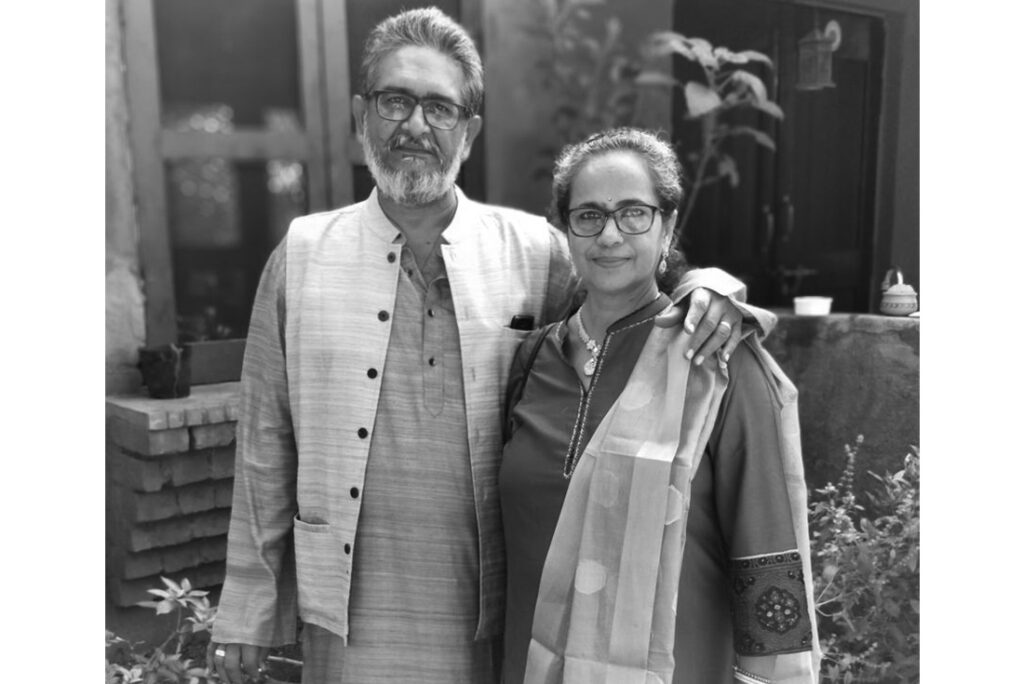
Partnering 20,000 families of Rayalaseema.
This is the story of a land that was at one time lying ravaged, drought-stricken and forsaken. It was a committed revolution led by a couple, Bablu Ganguly and Mary Vattamattam, which has now transformed this land into an agro forest habitat. The unproductive soil was rejuvenated, rain-water was harvested, trees were planted, crops were cultivated and the entire land blossomed.
Twenty years ago, Bablu and Mary set their foot on this barren land in the district of Anantapur in Andhra Pradesh. People had given up on this land, of which Bablu and Mary decided to buy 32 acres; probably the last thing one would expect from a young couple.
The spark that triggered this initiative was a book – ‘The One-Straw Revolution’, by a Japanese author Masanobu Fukuoka. The book carried a very special message on how humanity can live an enriching life hand-in-hand with nature. Bablu and Mary carried this spirit and conceived their vision for this land that they called ‘Timbaktu’, meaning‘Where the earth meets the sky.’Their aspiration was humble and they wanted to keep everything simple – get closer to the land and help it regenerate itself.
They knew there was potential in the land of Timbaktu, which was once part of the rich and powerful Vijayanagara Kingdom. Its forests were considered to be the finest, its fruits were savoured across the country and various armies fought to keep control of this once fertile land. But everything was destroyed by ruthless deforestation and use of environmentally damaging pesticides and fertilisers.
Over the years, villages in this region have been tormented by chronic drought, unproductive land, unemployment and poor infrastructural facilities. Bablu and Mary decided to build the Timbaktu land by engaging with the villages around and formed an NGO called The Timbaktu Collective.
“Our vision is to stop the degradation of the land in Anantapur district and to find ways to reverse it. We want to green the hills and the land. We want to develop alternative lifestyles. Lifestyles that are sustainable and provide more liberty and happiness, than those based on exploitation. The farmers see their land degrade and the wells drying up, but they don’t know what to do, so they just continue their patterns of self-destruction. We want to find a path that leads out of this vicious circle, not without but together with them” – they say.
In 1991, the couple decided to put their first crop in the land of Timbaktu and as everyone around them said, the crop failed. That became even more instigating – Bablu went ahead and bought 7,000 saplings. He and Mary brought farmers from the villages to build creative water harvesting structures ensuring that every drop of water was judiciously used. Seed dibbling and such traditional farming methods were practiced – and the colour of the land started changing. Timbaktu was transformed from a barren earth to a lush green forest. It’s heartening to see that birds, snakes and butterflies have come back to Timbaktu and a lost glory is reinstated. This is a true success story of eco-restoration and the experiment is being replicated with community support in a 10,000 acre waste land named as Kalpavalli.
The Timbaktu Collective grew to become a 105-member strong team who serve over 140 villages in Chennekothapalli, Roddam and Ramagiri mandals of Anantapur district. The organization runs two schools, one of which is a residential school for children from disadvantaged families. There is also a thrift credit system for women, which has now grown into a well established alternative banking system. Farmers in the villages are given training in organic farming methods and the Collective supports a Cooperative Society that assists the farmers in marketing their organic produce. With youth development, child rights activities, helping the disabled, cultural activities and many such programmes, the Timbaktu Collective has changed the face of humanity here.
Bablu and Mary stay in Timbaktu, in a house that is built with mud, built by them and built using things available in the land of Timbaktu. Their children studied in the school run by the NGO for the villagers. Their organisation has made a difference to the lives of over 12,500 marginalised families. How much more purposeful can their lives get? How much bigger role models do we need to start doing our bit for the world around us?
Visit Timbaktu to know the true spirit of this land. Find information about them on their website www.timbaktu.org. You can also write to them at timbaktu.info@gmail.com.
By Ranjini Sivaswamy (June 29, 2010).cSource: http://www.thebetterindia.com/
Pic courtesy: https://www.platform-mag.com/
